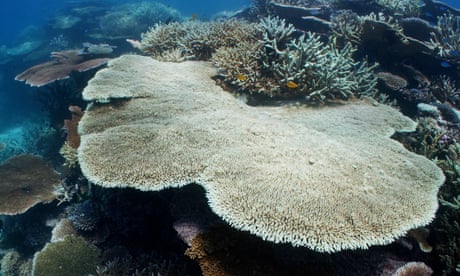- by foxnews
- 19 Mar 2025
UN mission must see coral bleaching to get ‘whole picture’ of Great Barrier Reef, experts say
UN mission must see coral bleaching to get ‘whole picture’ of Great Barrier Reef, experts say
- by theguardian
- 24 Mar 2022
- in news

A UN mission under way in Queensland to see if the Great Barrier Reef should be put on an "in danger" list will not get "the whole picture" unless it visits reefs currently experiencing coral bleaching, conservationists and the government's own reef envoy have said.
Details of the 10-day mission, which began on Monday in Brisbane, are being kept confidential and the locations to be visited have not been formally disclosed.
But Guardian Australia understands briefings started in Brisbane, and visits to Lady Elliot Island on the reef's southern tip, as well as time in Cairns and Townsville, are on the agenda.
The Great Barrier Reef Marine Park Authority (GBRMPA) is due to complete aerial bleaching surveys across the 2300-kilometre reef before the end of this week.
The authority's chief scientist, Dr David Wachenfeld, has confirmed bleaching is widespread but variable, saying the flights will give a clearer picture of how the event compares with five previous mass bleachings.
Fierce lobbying from the Morrison government last year saw the 21-country World Heritage committee ignore a Unesco recommendation that the reef be placed on a list of sites "in danger", mainly because of impacts from the climate crisis.
Instead, the committee asked Australia to renew its cornerstone Reef 2050 policy so that it "addresses the threat posed to the property by climate change" and said it was concerned progress in cutting pollution running off farms and grazing areas was too slow.
Australia requested the mission be carried out and the government's reef envoy, MP Warren Entsch, said it should visit reefs currently bleaching.
"They couldn't see the whole picture unless they did," he said. "There should be no whitewashing. They have to see the good and the bad."
Entsch, whose Leichhardt electorate centres on the reef tourism hotspot of Cairns, said he would meet with the mission.
"I've heard reports of significant bleaching [on some reefs] but also of no bleaching whatsoever. We have to acknowledge the vast area totally unimpacted by this and areas where we have seen magnificent growth [in corals]."
Entsch said the mission would be briefed by scientists from the Australian Institute of Marine Science, as well as reef managers at the marine park authority, traditional owner groups and tourism operators.
"They will talk to top scientists who have to make the decisions that we base our funding on," he said.
The aerial surveys will confirm if multiple reefs have bleached in at least two of the park's four management areas, which Wachenfeld said would constitute a "mass bleaching" event.
Over a 250km stretch in the reef's central region, north and south of Townsville, most reefs have bleached severely - where at least 60% of corals on a reef turn white - Wachenfeld said last week. Some corals had already died.
Widespread mass bleaching of corals was first seen in 1998, and happened again in 2002, 2016, 2017 and 2020. One study has said 98% of the 3,000 individual reefs that make up the entire system have been hit at least once by bleaching.
Unesco and the Morrison government have kept details about the mission under wraps. It is being carried out by one scientist from Unesco and another from the International Union for Conservation of Nature (IUCN).
Guardian Australia has confirmed the first formal briefings took place on Monday and Tuesday inside the Queensland government's offices in Brisbane. On Tuesday, Greenpeace staged a protest outside.
Representatives were briefed from four reef advisory groups that include scientific experts, community and industry stakeholders, tourism operators and traditional owners.
A spokesperson for the Queensland Resources Council - the mining industry's main lobby - confirmed its chief executive and former Liberal National resources minister, Ian Macfarlane, had been part of those private briefings.
The head of oceans at WWF Australia, Richard Leck, was also in the briefing, but said government officials had said Unesco requested "details of the mission be kept confidential".
Leck said he didn't know if the mission would visit any bleached reefs, but that it was crucial it did.
"The fact there's a bleaching event at the same time as the mission is here means it's of utmost importance that Unesco witnesses the damage that climate change is causing right now on the Great Barrier Reef," Leck said.
Greenpeace Australia Pacific said it has been asking the government since December for a slot to meet the mission, but climate campaigner Martin Zavan said the group had been "dismissed or ignored".
The custodian of Lady Elliot Island and manager of the resort on the island, Peter Gash, said mission scientists would have an overnight stay, tour the island's major reforestation project and see corals.
He said there had been "virtually no bleaching" on the island's reefs this year. A major long-term project to replant almost all the island's trees cleared by guano miners in the 19th century had seen major improvements to the health of the corals that fringe the shore.
A Unesco spokesperson declined to give any further details on the mission, or say if it would visit bleached reefs.
- by foxnews
- descember 09, 2016
Expedia customer says hotel requested cancellation because rate was too 'low'
A woman traveling overseas says she booked a hotel room through Expedia.com, only for the hotel to call and ask her to cancel due to the rate being too "low."
read more


